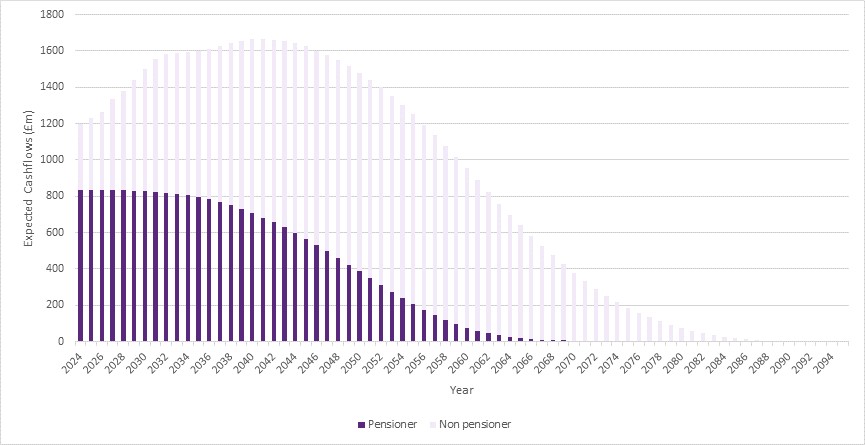NatWest Group operations and strategy are highly dependent on the accuracy and effective use of data.
NatWest Group relies on the effective use of accurate data to support, monitor, evaluate, manage and enhance its operations, innovate its products offering, meet its regulatory obligations, and deliver its strategy. Investment is being made in data tools and analytics, including raising awareness around ethical data usage (for example, in relation to the use of artificial intelligence) and privacy across NatWest Group. The availability and accessibility of current, complete, detailed, accurate and, wherever possible, machine-readable customer segment and sub-sector data, together with appropriate governance and accountability for data, is fast becoming a critical strategic asset, which is subject to increased regulatory focus. Failure to have or be able to access that data or the ineffective use or governance of that data could result in a failure to manage and report important risks and opportunities or satisfy customers’ expectations including the inability to deliver products and services. This could also result in a failure to deliver NatWest Group’s strategy and could place NatWest Group at a competitive disadvantage by increasing its costs, inhibiting its efforts to reduce costs or its ability to improve its systems, controls and processes, which could result in a failure to deliver NatWest Group’s strategy. These data weaknesses and limitations, or the unethical or inappropriate use of data, and/or non-compliance with data protection laws could give rise to conduct and litigation risks and may increase the risk of operational challenges, losses, reputational damage or other adverse consequences due to inappropriate models, systems, processes, decisions or other actions.
Any of the above may have a material adverse effect on NatWest Group’s future results, financial condition, prospects, and/or reputation.
NatWest Group’s operations are highly dependent on its complex IT systems and any IT failure could adversely affect NatWest Group.
NatWest Group’s operations are highly dependent on the ability to process a very large number of transactions efficiently and accurately while complying with applicable laws and regulations. The proper functioning of NatWest Group’s transactional and payment systems, financial crime, fraud systems and controls, risk management, credit analysis and reporting, accounting, customer service and other IT systems (some of which are owned and operated by other entities in NatWest Group or third parties), as well as the communication networks between its branches and main data processing centres, is critical to NatWest Group’s operations.
Individually or collectively, any system failure, loss of service availability or breach of data security could potentially cause significant damage to: (i) important business services across NatWest Group and (ii) NatWest Group’s ability to provide services to its customers, which could result in reputational damage, significant compensation costs and regulatory sanctions (including fines resulting from regulatory investigations) or a breach of applicable regulations and could affect NatWest Group’s regulatory approvals, competitive position, business and brands, which could undermine its ability to attract and retain customers and talent. NatWest Group outsources certain functions as it innovates and offers new digital solutions to its customers to meet the demand for online and mobile banking. Outsourcing alongside remote working heighten the above risks.
NatWest Group uses IT systems that enable remote working interface with third-party systems, and NatWest Group could experience service denials or disruptions if such systems exceed capacity or if NatWest Group or a third-party system fails or experiences any interruptions, all of which could result in business and customer interruption and related reputational damage, significant compensation costs, regulatory sanctions and/or a breach of applicable regulations.
In 2023, NatWest Group made considerable investments to further simplify, upgrade and improve its IT and technology capabilities (including migration of certain services to cloud platforms). NatWest Group also continues to develop and enhance digital services for its customers and seeks to improve its competitive position through enhancing controls and procedures and strengthening the resilience of services including cybersecurity. Any failure of these investment and rationalisation initiatives to achieve the expected results, due to cost challenges or otherwise, may adversely affect NatWest Group’s operations, its reputation and ability to retain or grow its customer business or adversely affect its competitive position.
Any of the above may have a material adverse effect on NatWest Group’s future results, financial condition, prospects, and/or reputation.
NatWest Group relies on attracting, retaining and developing diverse senior management and skilled personnel, and is required to maintain good employee relations.
NatWest Group’s success depends on its ability to attract, retain through creating an inclusive environment, and develop highly skilled and qualified diverse personnel, including senior management, directors and key employees (including technology and data focused roles), in a highly competitive market and under internal cost efficiency pressures.
NatWest Group’s ability to attract, retain and develop highly skilled and qualified diverse senior management (this may include a new permanent CEO in 2024) and skilled personnel may be more difficult due to the cost-controlling measures, a failure to pay employees competitive compensation, heightened regulatory oversight of banks and the increasing scrutiny of, and (in some cases) restrictions placed upon, employee compensation arrangements (in particular those of banks that have been in receipt of government support such as NatWest Group). In addition, certain economic, market and regulatory conditions and political developments may reduce the pool of candidates for key management and non-executive roles, including non-executive directors with the right skills, knowledge and experience, or may increase the number of departures of existing employees. Moreover, a failure to foster a diverse and inclusive workforce may adversely affect NatWest Group’s employee engagement and the formulation and execution of its strategy and could also have an adverse effect on its reputation with employees, customers, investors and regulators.
Many of NatWest Group’s employees in the UK, the ROI and continental Europe are represented by employee representative bodies, including trade unions and works councils. Engagement with its employees and such bodies is important to NatWest Group in maintaining good employee relations. Any failure to do so may adversely affect NatWest Group’s ability to operate its business effectively.
